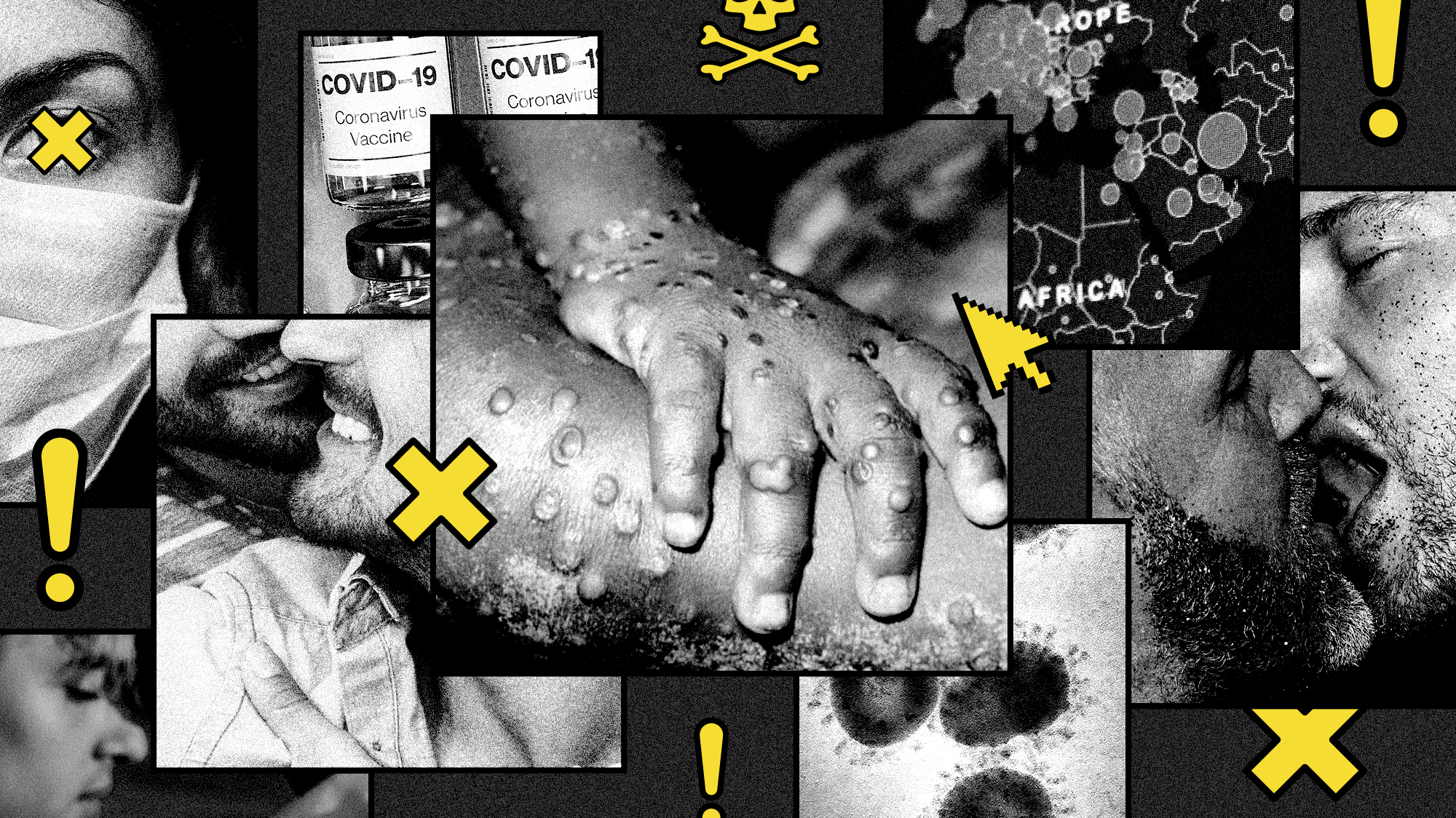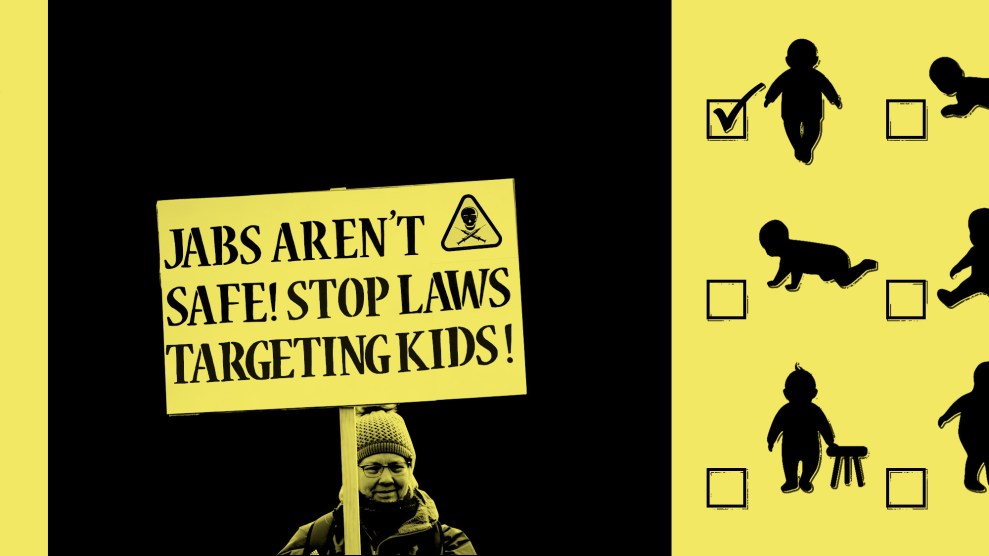Once upon a time, Alex Berenson was a New York Times journalist covering major stories, from the Iraq War to Hurricane Katrina to the Bernie Madoff scandal. But over the last several years, he’s increasingly focused on a new pet project: owning the libs. In his Substack newsletter “Unreported Truths” he rails against Joe Biden, derides the pro-choice movement, and complains about inflation to his “tens of thousands of subscribers.”
One of Berenson’s favorite themes has been to downplay the effectiveness of the Covid vaccines—and it’s this work in particular that has made him a star. Before Twitter kicked him off the platform for spreading vaccine disinformation last year, he had hundreds of thousands of followers. Berenson’s Substack newsletters over the last month have mostly been more of the same: He rails against “woke media whoppers about Covid vaccines” and describes Pennsylvania Democratic Senate nominee John Fetterman as a “fat vaccinated cannabis activist.”
But earlier this week, Berenson took aim at a new target: the growing global outbreak of the monkeypox virus. In a post titled “Is It Monkeypox or Crystalpox?” Berenson writes that public health authorities have “almost got another epidemic on the go—the perfect way to distract the shiny-haired robots in the media from the complete failure of the mRNA vaccines.” He then goes on to argue that monkeypox is strictly a disease of gay men. “Are you a gay man who likes sex with lots of other gay men?” he wrote. “Maybe in a bathhouse? Maybe names optional? Maybe with a meth bump on the side? No? Are you sure?… Okay. Don’t worry about the monkeypox thing then.”
With those two points—a supposedly overblown illness plus some homophobia—Berenson did what anti-vaccine activists do best. He managed to build upon his previous talking points and pivot to the current news cycle, neatly weaving the latest headlines into a grand conspiracy theory with necessary villains and egregious profiteering.
There is seemingly no topic too far afield for these zealots to exploit. Recently, I’ve reported on anti-vaccine influencers’ embrace of pro-Kremlin ideology and their promotion of dangerous disinformation about the baby formula shortage. But the monkeypox outbreak offers especially fertile ground because it allows the purveyors of misinformation to recycle many of the same talking points that they developed for Covid. The addition of homophobic rhetoric is particularly toxic, as it’s likely to unite anti-LGBTQ extremists with Covid denialists. As Yale epidemiologist and AIDS activist Gregg Gonsalves put it on Twitter earlier this week, this might be “that moment when homophobia meets far right pandemic politics.”
Let’s dispense with a few facts for some context: The monkeypox outbreak isn’t even a month old; the World Health Organization reported the first cases on May 13. The total count now exceeds 250 across 16 countries. The disease, which causes flu-like symptoms and painful lesions and is fatal in about 3-6 percent of cases, is endemic in parts of Africa, where outbreaks can often be traced back to contact with animals. Though monkeypox can be transmitted between humans, it isn’t nearly as transmissible as Covid—it usually requires close contact to spread, says Derek Walsh, a microbiology and immunology professor at Northwestern University’s Feinberg School of Medicine. Walsh, whose lab studies poxviruses, a class of illnesses that includes both monkeypox and its deadlier cousin, smallpox, emphasized in an email that although many of the cases in the current outbreak happen to be among men in the LGBTQ community, “There is no reason to believe now it has mutated to only spread sexually amongst men who have sex with men.”
Contrary to what Berenson claimed, Walsh said, the fact that thus far the disease has spread in this particular population is likely a coincidence. The initial patients probably “passed it on simply due to the close contact of sex, not necessarily sex itself and sex alone, before we became aware of the outbreak.” Indeed, a top adviser to the World Health Organization told the Associated Press earlier this week that he believed the outbreak was a “random event” that happened to spread at two raves in Spain and Belgium.
The rumors that monkeypox is a disease of gay men are a visceral reminder to public health experts of the terrifying early days of the HIV epidemic in the mid-80s. Gonsalves warned of this dynamic in a tweet thread on monkeypox earlier this week. “There are always people ready to use disease to stigmatize and scapegoat,” he wrote. The United Nations issued a similar warning this week saying that “lessons from the AIDS response show that stigma and blame directed at certain groups of people can rapidly undermine outbreak response.”
One current and far-fetched conspiracy theory that links homophobia with the antivax movement is that monkeypox isn’t monkeypox at all—rather, influencers claim that it’s a side effect of HIV caused by the Covid vaccines. In a lengthy Instagram story called H(!)V/pox, an anti-vaccine account called @theshinedontstop, which has 88,000 followers and has also dabbled in pro-Putin rhetoric, put forth this theory, using alternative spellings to evade disinformation algorithms. “There are many reports of people who received the c(0)^!d v*(c)(!ne, and then were diagnosed with A!D$,” the story says. (That’s not true.) “Now…they claim for the FIRST TIME EVER…their munkeepox is sexually transmitted AND being spread by gays and gay pride festivals. Feels like a disclosure of h(!)v to me.”
Other accounts have shared disinformation that may not be explicitly homophobic, but is still troubling. For example, one widely shared meme shows a sign reading “Monkeypox is a cover story for vaccine-acquired shingles. Change my mind.” Another meme showing a still from the movie Austin Powers reads, “Fear of covid is receding. Release the monkeypox!!!”
Influencers aren’t the only ones promoting myths around monkeypox. Far-right radio personality and Trump ally Alex Jones claimed that Covid vaccines caused it. Last week, Rep. Marjorie Taylor Greene (R-GA) took an old conspiracy theory—that Bill Gates engineered Covid for profit—and simply replaced the disease. “Bill Gates is very concerned about monkeypox because this is something, apparently, he can make a lot of money off of,” she said on her Facebook Live show. Prominent antivaccine physicians have also taken up the cause. In his recent Substack newsletter, Dr. Paul Alexander, a former Trump adviser who was also an ardent supporter of the anti-vaccine trucker convoys in Canada and the United States, speculated that Covid vaccines may have left us vulnerable to other diseases. “Our immune systems may now be seriously compromised (in vaccinated persons) due to the Covid vaccine,” he wrote. “Monkeypox may be the tip.” (The idea that Covid vaccines weaken the immune system has been debunked.)
On May 20, Dr. Aaron Kheriaty, a professor of psychiatry and human behavior who was fired from his post at the University of California-Irvine for refusing to get vaccinated against Covid, suggested in a Twitter thread to his 157,000 followers that the monkeypox virus had been intentionally released by powerful global public health authorities in order to enrich the pharmaceutical companies who make vaccines and treatments. As evidence for this theory, he cited a simulation exercise conducted last year, in which epidemiologists practiced planning a pandemic response using a hypothetical monkeypox outbreak as an example. This particular conspiracy theory has been repeated widely, including by Robert F. Kennedy’s antivaccine group Children’s Health Defense and the Covid-minimizing think tank the Brownstone Institute.
The reality, not surprisingly, is much less exciting. Epidemiologists frequently use simulations to prepare for outbreaks—this kind of planning is a crucial public health tool. The very fact that experts included a monkeypox outbreak simulation suggests that they considered it a possibility. “While you might hear on the news that scientists are surprised by this outbreak, that’s not entirely true,” said Walsh. “We have been watching monkeypox adapt to human-to-human transmission in Africa for several decades, so it was just a matter of time before this happened.” Walsh said he was appalled by the suggestion that monkeypox was in any way related to Covid vaccines. “We are testing people,” he said, “so the simple fact is we know it’s pox, not herpes or HIV.”
Yet undramatic facts don’t seem to gain traction as easily as sweeping narratives about powerful people with nefarious motives. Social media platforms seem to be struggling to keep up with the onslaught of monkeypox content. Twitter says in its community guidelines that users may not “share false or misleading information about Covid-19 which may lead to harm.” Substack has no such policies. Neither of those companies responded to a request for comment about their policies regarding monkeypox disinformation or homophobic rhetoric. A spokesperson from Meta, the parent company of Facebook and Instagram, noted that the fact-checking organizations that it works with have been monitoring monkeypox content. Punishments for sharing such content range from demotion in the visibility algorithm to removal. The spokesperson didn’t specifically address the homophobic narratives around monkeypox, but my quick Facebook search turned up several examples of posts that called monkeypox a consequence of a “sinful” lifestyle.
It’s possible that the social media platforms simply aren’t monitoring monkeypox content as carefully for homophobia as they are for more straightforward disinformation. In his Substack post, Berenson rejected the idea that Covid vaccines cause monkeypox. “[Y]ou can go full Alex Jones and start screaming about how the DNA/AAV Covid vaccines are giving us monkeypox!” he wrote. “Do you know what happens to my blood pressure when woke morons on Twitter compare me to Alex #@$%TG$ Jones? If I stroke out, you’ll know why.” This is a tactic: By distancing himself from some of the wildest conspiracy theories, Berenson, who didn’t respond to my request for comment, makes his own homophobic take look reasonable by comparison. Throughout the pandemic, rogue scientists and other influential contrarians have leveraged their credentials to gain credibility and separate themselves from the tin-hat-wearing masses.
The proliferation of this kind of disinformation on social media is a particular frustration for Walsh, who is watching in horror as the truth about a disease he has studied for years becomes distorted by conspiracy theorists. “It’s really disappointing that some people maliciously spread this kind of stuff, but I guess that’s their intent,” he said. “They probably know full well what they are doing.”
Images from left: Engin Akyurt/Unsplash, Radek Pestka/Unsplash, Christian Buehner/Unsplash, Daniel Schludi/Unsplash, BSIP/UIG/Getty, Martin Sanchez/Unsplash, Sushil Nash/Unsplash








